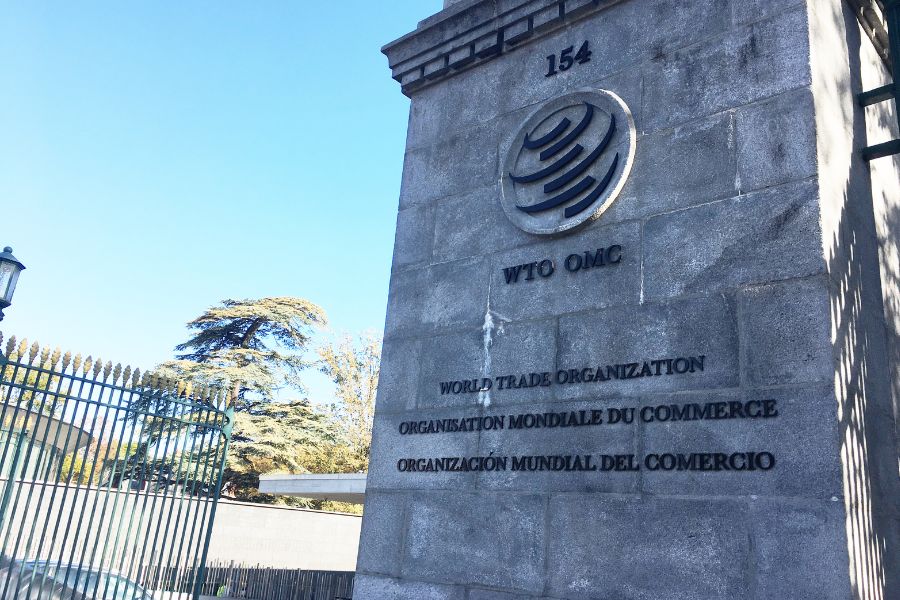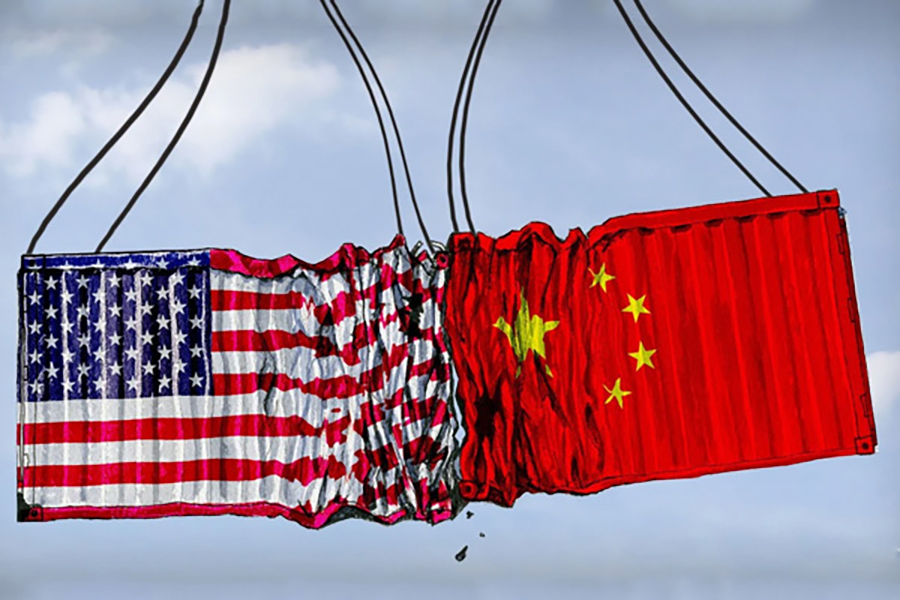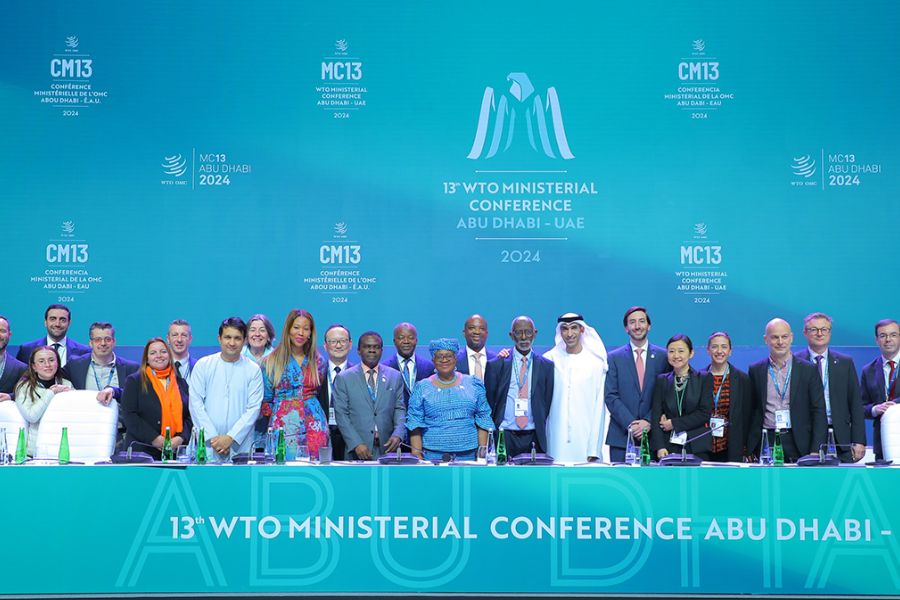WTO’s Abu Dhabi package must deliver pragmatic outcomes
In the forthcoming WTO Ministerial Conference that begins in Abu Dhabi on February 26, the international community is seeking some pragmatic outcomes. There are several contentious issues on the table. However, it will be in good interest of the multilateral trading system if the developed countries are flexible and accommodating to the concerns of the Global South. The authors examine some such key issues on the table including public stockholding, fisheries subsidies, e-commerce moratorium, investment facilitation, and revival of the appellate body.

Image Source: WTO
The 13th WTO Ministerial Conference (MC13) begins in Abu Dhabi on February 26. All eyes are set on pragmatic outcomes that can reinforce the significance of multilateral trading system. Among the various agenda issues in the forthcoming MC13, we examine few of them here.
First, it is the issue of public stockholding (PSH) which is very crucial. PSH pertains to the procurement, storage and release of food stocks from producers to consumers via the government. Whereas, ‘procurement’ can provide income support and incentives for farmers, ‘release’ helps providing subsidised price to sustain livelihood to people who are socio-economically vulnerable. This issue is very crucial in context of developing countries and the least developed countries (LDCs) alike where ensuring food security remains a major public policy concern. In fact, the challenge that exist in the PSH programs, in developing countries, pertains to the apprehension that when a government purchases the produce from the farmers at a price fixed by the government i.e. at the supported price, the agricultural subsidy therein may breach the 10 per cent limit. This was a major issue in the Bali Round of 2013 where a “peace clause” was agreed upon to give relief to developing countries as an interim solution in case there was a breach of the limit. But since then, none of the ministerial conferences held in Nairobi 2015 or Buenos Aires 2017 or Geneva 2022 could reach a pragmatic outcome on the issue of PSH. Therefore, in the forthcoming Abu Dhabi MC13, India and several other countries of the Global South are seeking a ‘permanent solution’ to the PSH.
Second, the implementation of the agreement on fisheries subsidies remains a concern. To ensure ocean sustainability, WTO adopted the agreement on fisheries subsidies in June 2022. The aim is to curb harmful subsidies that is causing overcapacity and overfishing in the exclusive economic zones of developing countries, the small island countries, as well as for the LDCs. This agreement pertains to fulfilling the SDG target 14.6 that also calls for eliminating subsidies that lead to illegal, unreported, and unregulated (IUU) fishing. In fact, at the MC13, WTO will seek an early ratification of the agreement by member countries, and may also continue to negotiate on additional provisions to curb harmful subsidies. Additionally, the WTO members need to implement ‘special and differential treatment’ provisions that allows longer transition period for developing countries and LDCs. In fact, India, which is not among the major fisheries subsidisers, still experiences overfishing and IUU activities in its EEZ. However, since India also need to give subsidies to its low-income fishermen, it does not want a curb on fisheries subsidies altogether. In fact, in the interest of small fishermen, India seeks to keep small-scale fishing out of the MC13 negotiations.
Third, e-Commerce Moratorium is yet another issue on the table. Since 1998, there has been a continuous extension of moratorium on customs duty on electronic transmissions. The transmission includes digital products like photo films, music, etc. In fact, the MC12 held in Geneva in 2022 also extended this moratorium, and now MC13 has to take a call on it. India seeks to oppose the extension of moratorium on electric transmissions as India loses on revenue from its digital trade, while some developed countries get larger benefits because of the moratorium.
Fourth, investment facilitation agreement is another issue that remains contentious. In November 2023, the text of the ‘Agreement on Investment Facilitation for Development’ (IFD) was finalised. The IFD, which is backed by 130 countries, seeks to reduce regulatory uncertainty and make investor’s participation simpler and transparent. Furthermore, it seeks to provide technical support and capacity building assistance to the LDCs, with the aim of helping them attract more investments. India, however, is not convinced with the modalities of this agreement. IFD is seen as a China-backed initiative, and one that does not have a multilateral grounding. So, India apparently sees it as a non-multilateral issue, and therefore not worthy of being discussed in the WTO.
Finally, WTO must focus on reviving the Appellate Body (AB). AB is an integral part of the WTO dispute settlement system – negotiations on which is currently witnessing a stalemate. When US President Donald Trump was waging the trade war against China, US also began blocking the appointment of new judges in the AB thus finally making it dysfunctional in December 2019. At the MC12, the WTO members called for a fully functional, transparent, and an inclusive dispute settlement system by 2024. It needs to be seen how such a negotiation can potentially shape up, and what will be the possible outcome.
Moreover, WTO should abstain from giving space to non-trade issues in its final draft, especially at a time when trade-related issues still need intense negotiations and pragmatic outcomes.
Dr Faisal Ahmed is a professor in the international business area teaching trade and geopolitics at FORE School of Management, New Delhi. Suresh P. Singh is Senior Director, VeKommunicate, a public policy research and advocacy organization in Gurugram. Views are personal.













Leave a comment